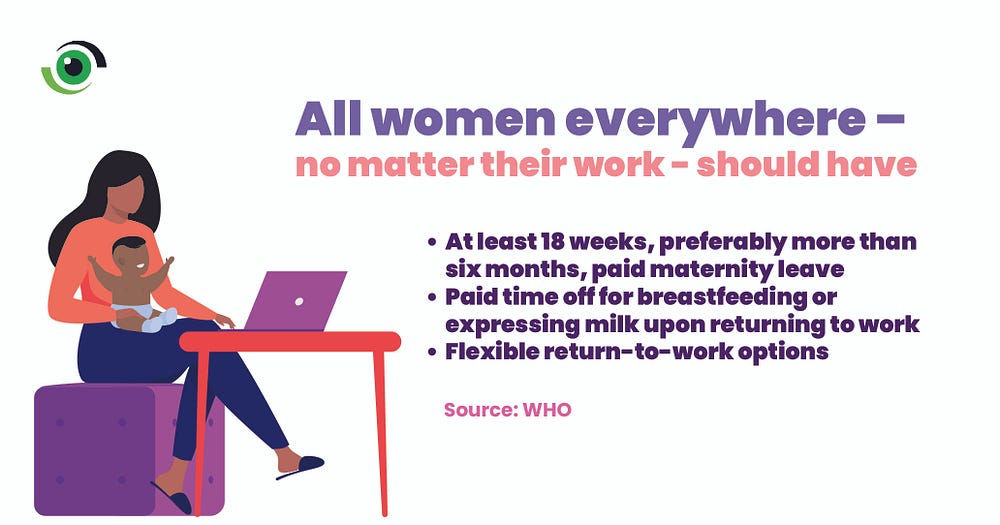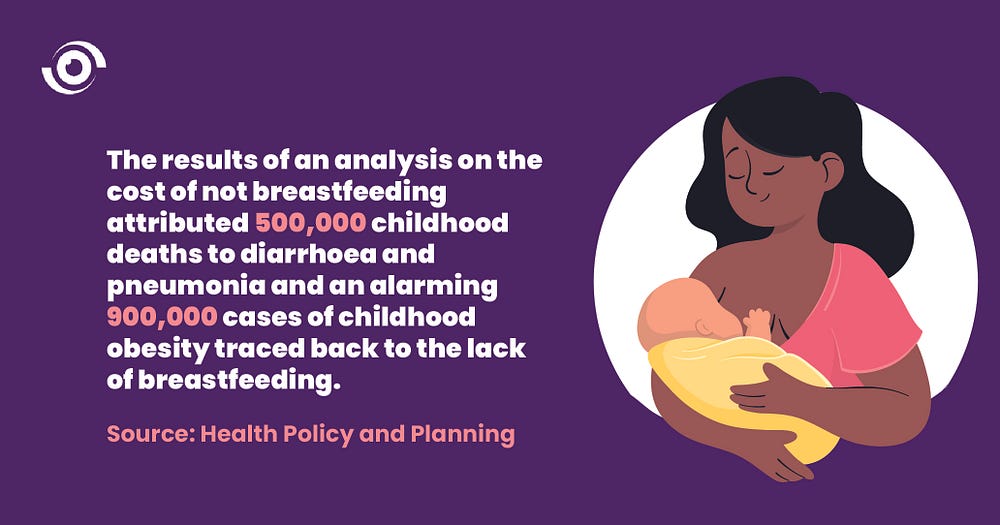By Onyedikachi Ewe and Bernard Otu Assim-ita (Lead Writers)
Breastfeeding is an important part of a baby’s growth, especially during the first 1000 days. This period, from conception to the child’s second birthday, is critical for a child’s development and overall well-being. However, for many mothers who must return to work, continued breastfeeding can be difficult if they are not supported. While some working mothers receive the necessary support, others encounter significant challenges that hinder their ability to practice exclusive breastfeeding (EBF) for the first six months of life and continued breastfeeding for the next 18 months, along with appropriate complementary feeding as recommended by the World Health Organisation (WHO).
Therefore, the 2023 World Breastfeeding Week (WBW) campaign theme, “Let’s make breastfeeding and work, work”, recognises the significance of breastfeeding for both the health of the baby and the well-being of the mother and focuses on the crucial aspect of supporting working mothers in their breastfeeding journey. By creating a supporting environment and implementing policies that enable women to continue breastfeeding while successfully balancing their work responsibilities, organisations and societies can make breastfeeding and work complement each other rather than being mutually exclusive. Supporting working mothers in their breastfeeding journey not only contributes to the health and development of the child, but also fosters a positive and inclusive work environment that values the well-being of its employees. Integrating breastfeeding and work is a collective responsibility that benefits families, employers, and society.

Although women account for 43.8% of Nigeria’s workforce, only 9% of organisations have a workplace breastfeeding policy. According to the National Demographic and Health Survey 2018 (NDHS 2018), Nigeria’s exclusive breastfeeding rate is 29%, indicating that only a percentage of infants aged 0–6 months are exclusively breastfed; this means that 71% of infants do not benefit from breast milk in their formative years. This is far below the global target of 50% by 2025 set by the World Health Assembly (WHA).
Breastfeeding plays a vital role in the holistic development of children. It is a highly effective method to safeguard child health and survival, as breastfed children have fewer childhood infections and fewer chronic diseases. Beyond the evident health benefits, breastfeeding provides human capital and future economic benefits for children, mothers and countries. The results of an analysis on the cost of not breastfeeding attributed over 500,000 childhood deaths to diarrhoea and pneumonia and more than 900,000 cases of childhood obesity traced back to the lack of breastfeeding.

Surmounting the challenges to exclusive breastfeeding
The Nigeria Labour Law Act stipulates that pregnant female employees are entitled to 12 weeks of paid maternity leave. However, for many mothers, this is inadequate, not to mention that the Act is not fully implemented, particularly in private sector establishments. The inadequate period and lack of full implementation compels new mothers to return to work prematurely. Consequently, they face the daunting task of balancing their work commitments and breastfeeding responsibilities, often leading to early weaning or introducing supplementary feeding before the recommended age.
Some countries worldwide have successfully surmounted challenges to exclusive breastfeeding and extended nursing, providing best practices that Nigeria can adopt.
1. Sweden: A forerunner in parental leave policy, Sweden provides up to 480 days of paid parental leave that can be split between parents until the kid reaches the age of eight. This promotes active parental involvement in early child-raising, exclusive breastfeeding, and stronger family relationships.
2. Norway: Because of its comprehensive maternity leave policy, which provides 49 weeks of paid leave or 59 weeks at a discounted rate, Norway has increased exclusive breastfeeding rates. Norway also prioritises workplace support for nursing moms, including separate breastfeeding rooms and flexible working hours.
3. Burkina Faso: An African case study Burkina Faso has made tremendous gains in promoting exclusive breastfeeding in this context. The country’s approach includes community education, participation with traditional leaders, and training traditional birth attendants to encourage breastfeeding mothers.
Let’s make Breastfeeding and work, work!
In a press release to mark the World Breastfeeding Week in Nigeria, Cristian Munduate, UNICEF Nigeria Country Representative, advocated for paid six-month maternity leave, paid paternity leave, flexible return-to-work options, regular lactation breaks during working hours and adequate facilities that enable mothers to continue exclusively breastfeeding for six months. He urged governments and businesses to support mothers and caregivers because “Investing in breastfeeding support policies and programs in all settings, especially during crises and in food-insecure regions, is crucial to ensure the well-being of our children and the progress of our society”.
Recognising women’s substantial contributions to Nigeria’s economic growth and the undeniable benefits of breastfeeding for infants, mothers, and countries, workplaces must create an enabling environment for women to thrive professionally. This means deliberately implementing breastfeeding-friendly policies, like extended paid maternity leave, flexible work hours, and provision of lactating rooms and creches. By fostering such supportive measures, workplaces can embrace inclusivity and empower women to succeed in their careers, while ensuring the well-being and nourishment of the next generation.
Commemorating World Breastfeeding week in 2021, Nigeria Health Watch convened a policy dialogue with the theme, “Strengthening Workplace Policies for Exclusive Breastfeeding: A Shared Responsibility”.
Key takeaway points from the policy dialogue included:
- Protecting breastfeeding should be everyone’s responsibility, not just the mothers, as it benefits society.
- Make breastfeeding the new normal. Employers can do better, for example, by providing flexible work options and at least 10 square meters of space for breastfeeding mothers.
These key points tie in with this year’s campaign asks to policymakers and employers, which include:
- Legislating at least 18 weeks, preferably more than six months, paid maternity leave.
- Ensuring employers provide paid time off and a dedicated space for breastfeeding or expressing milk after this period.
- Ensuring all women have access to maternity entitlements, including those in the informal sector or on limited contracts.
- Tackling employment-related discrimination against women, including during and after pregnancy and birth.
- Providing options that reduce the separation of women from their babies after maternity leave, such as flexible work schedules, on-site childcare, teleworking, part-time work and letting mothers bring their babies to work.
Essentially, to reap the vast benefits of breastfeeding and pave the way for healthier generations and a thriving Nigerian workforce, all stakeholders must collectively strive to make breastfeeding work for mothers.


